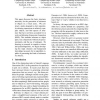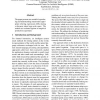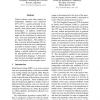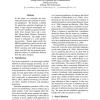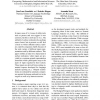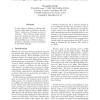125
click to vote
INLG
2010
Springer
14 years 11 months ago
2010
Springer
There were three GREC Tasks at Generation Challenges 2010: GREC-NER required participating systems to identify all people references in texts; for GRECNEG, systems selected corefe...
126
click to vote
INLG
2010
Springer
15 years 5 days ago
2010
Springer
This paper discusses the basic structures necessary for the generation of reference to objects in a visual scene. We construct a study designed to elicit naturalistic referring ex...
136
click to vote
INLG
2010
Springer
15 years 5 days ago
2010
Springer
The paper presents two models for producing and understanding situationally appropriate referring expressions (REs) during a discourse about large-scale space. The models are eval...
158
click to vote
INLG
2010
Springer
15 years 5 days ago
2010
Springer
Critical software most often requires an independent validation and verification (IVV). IVV is usually performed by domain experts, who are not familiar with specific, many times ...
116
click to vote
INLG
2010
Springer
15 years 5 days ago
2010
Springer
In this paper, we propose a general way of constructing an NLG system that permits the systematic exploration of the effects of particular system choices on output quality. We cal...
127
click to vote
INLG
2010
Springer
15 years 5 days ago
2010
Springer
In this paper we investigate the automatic generation and evaluation of sentential paraphrases. We describe a method for generating sentential paraphrases by using a large aligned...
124
click to vote
INLG
2010
Springer
15 years 5 days ago
2010
Springer
This paper presents an easy-to-adapt, discourse-aware framework that can be utilized as the content selection component of a generation system whose goal is to deliver descriptive...
132
click to vote
INLG
2010
Springer
15 years 5 days ago
2010
Springer
In many areas of NLP reuse of utility tools such as parsers and POS taggers is now common, but this is still rare in NLG. The subfield of surface realisation has perhaps come clos...
127
click to vote
INLG
2010
Springer
15 years 5 days ago
2010
Springer
In this paper we present a reference generation model based on Reference Domain Theory which gives a dynamic account of reference. This reference model assumes that each referring...
145
click to vote
INLG
2010
Springer
15 years 5 days ago
2010
Springer
We present a novel approach to natural language generation (NLG) that applies hierarchical reinforcement learning to text generation in the wayfinding domain. Our approach aims to...

